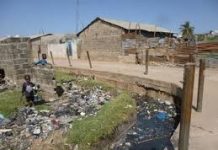Student members of the Social Science club of Kotu Senior Secondary
School on Saturday, 16th December, 2015 organised a seminar on the
history of nation building, legal journalism, career planning andpublic speaking techniques at the school’s main hall.
The guest speaker who was invited to dwell on the selected topics was
Mr. Halifa Sallah, a sociologist. The other speakers were practicing
journalists and activists.
Amadou Ceesay, the President of the Social Science Club, thanked the
club membership for their efforts in ensuring that the event was
successfully staged. He noted that during his tenure as the president
of the club, he ensured that every member was treated as an equal.
Mr. Ceesay said the event is organised for their members to learn more
about the struggle for independence in Africa, in general, and the
Gambia, in particular. He added that some of their members are
graduating from secondary school and therefore need advice on career
selection as well as exposure to public speaking techniques.
Addressing the gathering, Mr. Halifa Sallah, the guest speaker,
dwelled on the efforts made by Africans during the struggle for
independence from colonial rule, adding that the key strategy used,
particularly in British West Africa, was the formation of
organisations. He said the pioneers organized themselves by forming
effective trade unions that fought for independence. He said the
unions in British colonies have seen that paying taxes without
representation is undemocratic and that it was this that subsequently
made them to agree unanimously that there should be no payment of tax
without representation.
Mr. Sallah explained that after this agreement and lot of other
resistance measures such as the use of the media to sensitise the
people, things began to change and countries starting with Ghana
attained independence in 1959. He said after this, Nigeria, Sierra
Leone and the Gambia followed.
“However, although the Gambia got independence in 1965, it was not a
total freedom as power was still vested in the Queen of England.
Again, a referendum was conducted to decide the total freedom of
the Gambia but due to inadequate knowledge about the issue, the
majority voted for no and the Gambia continued under British control,”
said Sallah.
He said it was not until 1970 when the Gambians have finally decided
at another referendum that they need absolute independence and
subsequently The Gambia became a republic.
Mr. Kebba Jeffang, a Foroyaa reporter, who mainly covers court
proceedings, shared his experience on court reporting. He said legal
journalism is considered by many as a sensitive area and thus avoid
reporting on court matters. He said as conceived by many, legal
journalism is beyond court reporting; and that it is any report
pertaining to law.
“Every journalist reporting in court should be very careful and limit
the report to what has been said in court to avoid prejudice. You must
be careful and get all the arguments of the prosecution and defence as
well as the rulings by the magistrate or judge. You must ensure you
report the proceedings fairly without defaming one side. Contempt of
court is a criminal offence and a journalist can be sent to jail by
the overseer of the court for it,” he advised.
Saikou Suwareh Jabai, another reporter with Foroyaa newspaper, also
shared with students some ideas regarding the selection of a career.
He said many people are paying a price for choosing the wrong career
which does not suit them. He advised that a career should not be
chosen out of haste or desperation but that one should be very careful
when deciding it.
Mr. Mutarr Jallow, a child rights activist, who dilated on the
techniques of public speaking, said the act of speaking in public can
be disturbing but requires training in order to be successful. He
advised the students to be trained on public speaking and be ready
for public responsibilities.





















